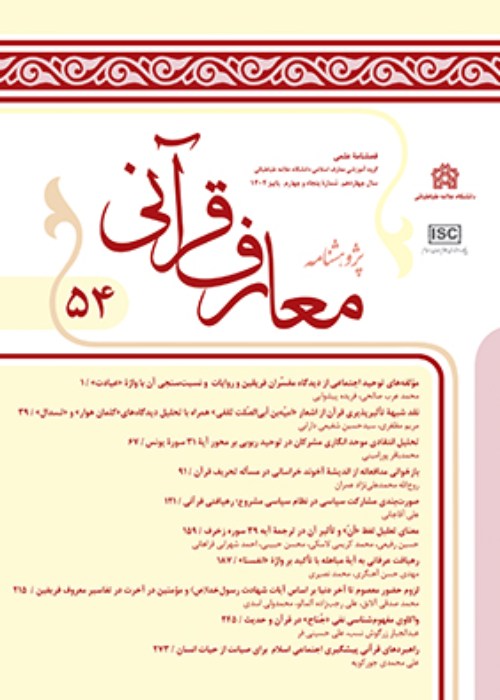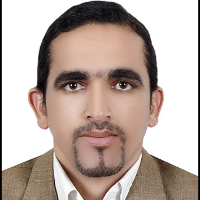Contrasting the Discursive Worldview of Prophet Noah (PBUH) and His People in Surah Hud according to Van Dyck's Critical Discourse Analysis
Critical discourse analysis seeks to discover the speaker's worldview by examining the manner of discourse with extratextual conditions. Van Dijk considers language to be the carrier of the speaker's ideology and to be loaded with power. In the critical discourse, he emphasizes the positive characteristics of oneself and the negative characteristics of others, emphasizing the rejection of the positive characteristics of others and the negative characteristics of oneself in lexical, syntactic, rhetorical, semantic, and argumentative microstructures. Surah Hud has a conversation between Prophet Noah and his people, in which both sides of the conversation try to emphasize their positive characteristics and the negative characteristics of others and reject their negative characteristics and the positive characteristics of others. The research aims to analyze the discourse of Noah and his people in Surah Hud with Van Dyke's descriptive-analytical method and critical discourse analysis. In Surah Hud, Noah's speech, despite the stubbornness and threats and insults of his people against him, is mostly based on strengthening his positive characteristics and the negative characteristics of his people with softness and tolerance and a flexible and questioning language with a rich emotional charge. It is a type of friendship based on religious democracy and logical reasoning to make his people think in order to avoid stubbornness, which by using different language forms, changes the discourse to himself, taking into account the benefit of himself and his people, so as to make them guide him to the right path, but his people, with inflexible and decisive language indicating a dictatorship, try to reject other positive characteristics in order to give legitimacy to Hud's speech and remove legitimacy from Prophet Noah's speech.
Discourse analysis reveals the speaker's ideology by examining the speaker's language. Van Dijk proposes four basic pillars to highlight the ideology of discourse: highlighting one's positive works and marginalizing one's negative works, and marginalizing other positive works and highlighting other negative works.
The Holy Quran has a special ideology that depends on the ideology of the author of the word, Van Dijk considers ideology as a means to produce unbalanced power relations in society, whose tool is language. Surah Hud is one of the Meccan surahs of the Holy Quran, which contrasts the ideology or the ruling belief of Prophets such as Noah, Hud, Saleh, etc. The spiritual power of these prophets is expressed by the material power of their stubborn people.
The importance and necessity of the research is that Van Dyck's ideological square model shows the ideology of Prophet Noah and his people and their emotional burden full of altruism or hostility and stubbornness, and by examining the language of the two sides' conversations on the authenticity of the prophethood of Prophet Noah and His true language affirms that despite the stubbornness, threats, and insults of his people against him.
Based on Van Dyck's descriptive analytical method and critical discourse analysis theory, this article tries to analyze the conversation between Prophet Noah (PBUH) and his people in Surah Mubarakah Hud through the following questions:How and using what styles does Prophet Noah (PBUH) express his ideology?
How and using what styles did the people of Noah (PBUH) express their ideology?
Prophet Noah and his unbelieving people in Surah Hud as manifestation of monotheism and polytheism, each of them expresses and emphasizes their ideology, and in this, Van Dyck's ideological square model is presented, in such a way that all verses are based on highlighting one's own positive features and marginalizing one's negative features and highlighting other negative features and marginalizing other positive features by using rational, lexical, syntactic, rhetorical and argumentative microstructures. Prophet Noah's speech, which has the ideology of calling for the oneness of God and the mission and prophethood of God, includes all four plans, but mostly on the basis of highlighting the positive characteristics of the self and highlighting the negative characteristics of others with softness, reasoning and logic, and sometimes based on marginalizing one's negative characteristics and rejecting other positive characteristics, using intellectual, lexical, syntactic, rhetorical and argumentative structures such as argumentative and questioning styles to think. Forcing his people with words and rhetorical elements is indicative of the softness, flexibility, and breadth of his language and ideology, to the extent that sometimes in order to accept his call and prophethood by his people, he disagrees with some of their opinions such as his being a human being, not being one of the nobles and leaders. He accompanied his companions and others in order to prove that his being a human being and his companions not being nobles and not having material possessions are not against his prophethood, to pave the way for them to distance themselves from stubbornness and accept his mission and call. For this reason, Prophet Noah (PBUH) gives them short-mindedness and ignorance through the expression of these things in order to highlight their negative characteristics and his positive characteristics and to prove his mission and prophethood. These logical arguments and soft, flexible, and tolerant language are on the basis of democracy.
But the discourse of his people, who have the ideology of disbelief, polytheism, and idolatry, is mostly based on highlighting other negative characteristics (Noah) with violence, threats, and humiliation with inflexible language and decisiveness in words that indicate a dictatorship in the seat.
- حق عضویت دریافتی صرف حمایت از نشریات عضو و نگهداری، تکمیل و توسعه مگیران میشود.
- پرداخت حق اشتراک و دانلود مقالات اجازه بازنشر آن در سایر رسانههای چاپی و دیجیتال را به کاربر نمیدهد.



